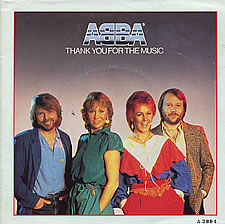This article needs additional citations for verification .(September 2010) |
| "Thank You for the Music" | ||||
|---|---|---|---|---|
 | ||||
| Single by ABBA | ||||
| from the album The Album | ||||
| A-side | "Eagle" | |||
| Released | 18 May 1978 | |||
| Recorded | 21 July 1977 | |||
| Studio | Glen Studio | |||
| Genre | Pop | |||
| Length | 3:52 | |||
| Label | Polar | |||
| Songwriters | ||||
| Producers |
| |||
| ABBA singles chronology | ||||
| ||||
| ||||
| ||||
| Music video | ||||
| "Thank You for the Music" on YouTube | ||||
| Alternative cover | ||||
 1983 artwork for UK release | ||||
"Thank You for the Music" is a song by the Swedish pop group ABBA. It was originally featured on the group's fifth studio album, The Album (1977),and was released as a double-A sided single with "Eagle" in May 1978 in limited territories,namely Belgium,the Netherlands,Germany,France,Austria,Switzerland and Australia. In South Africa where it peaked at number 2 in August 1978 and became the eighteenth best-selling single of that year.
Contents
- History
- Reception
- Charts
- Weekly charts
- Year-end charts
- Certifications
- Personnel
- References
- External links
"Gracias por la Música" is the Spanish-language recording of "Thank You for the Music",with lyrics by Buddy and Mary McCluskey. The B-side was the Spanish-language version of "Gimme! Gimme! Gimme! (A Man After Midnight)" entitled "¡Dame! ¡Dame! ¡Dame!". The song was released in 1980 to promote the band's Spanish-language album/compilation Gracias Por La Música . It was the group's seventh best-selling Spanish single,and also peaked at number 4 in Argentina.
"Thank You for the Music" also formed part of ABBA:The Movie which featured studio recordings of selected songs from the then newly released album ABBA:The Album . The song is included in the final scenes as the hapless journalist finally gets to broadcast his ABBA radio special,including an interview,on Australian radio. The song is accompanied by footage of a studio recording session,a live stage performance and a mimed studio performance by the four members of the group. The song also plays over the closing titles as the camera pans out from the band performing in a hut on an island in the Stockholm archipelago to views of the archipelago itself.
The song was re-released in November 1983,to promote the Epic Records compilation album of the same name.